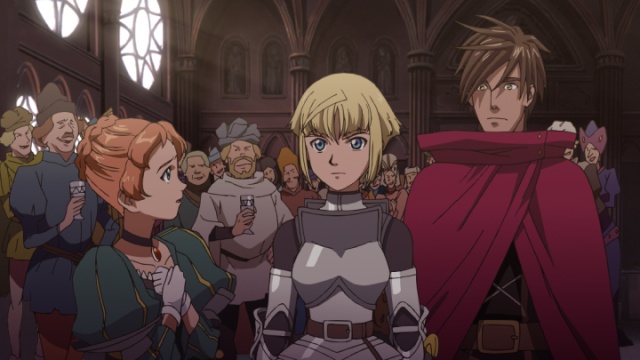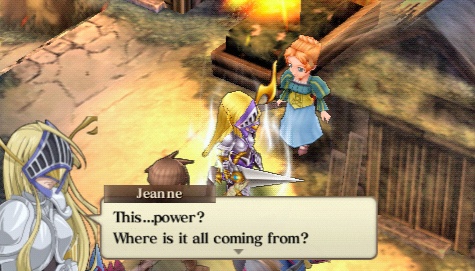The real story of Joan of Arc is as dramatic as any ancient myth or legend. Driven by religious visions, Joan led French troops to nigh impossible victories, but eventually fell victim to political hypocrisy. A sham trial resulted in her execution in 1431. The story's been told and retold for centuries in theater, film, and song. But games seem like an awkward host for Joan's spiritual journey, a fact made clear by previous attempts to do so. By the same token, it really doesn't sound like a great idea to throw in fantasy creatures, magic bracelets, and demon possessions. But Jeanne D'Arc defies expectations in a number of ways because it manages to twist the story into something legitimately exciting. In fact, it is a fun and user-friendly strategy role-playing game. It doesn't break new ground, but it twinkles with cleverness, as well as slick design, and is one of the best RPGs on the PSP so far this year.

What of all this religious business anyway? Jeanne D'Arc doesn't gloss over the spiritual aspects of the story, though Jeanne's heavenly visions aren't a simple matter of divine intervention in this retelling. This is a fantasy version of events, where dogmen and demons clash, while the English child-king looks ready to spew pea soup at any minute. It could have been tacky and disrespectful to the legend, but instead it's a surprising, personal journey of discovery populated with clearly drawn, likeable characters. Jeanne herself is a conflicted, complex heroine making sense out of newfound supernatural skills and England's insidious invasion of France. As the game's intensity ramps up, the 30-hour story hurtles toward an explosive conclusion.
Just as the story revamps a classic, the gameplay also infuses the traditionally dense and slow-paced strategy of the genre with urgency. As in most SRPGs, you place members of your party onto the game grid then take turns moving them, attacking enemies, and using items or spells. And just as you'd expect, such factors as the way a character faces or terrain height determine where you move your party members and how you attack the enemy. But if those things are what make Jeanne D'Arc traditional, it's how developer Level 5 layers in just the right amount of complexity and accessibility with features that make battles fluid, as well as truly dynamic.
The quick pace of battles is Jeanne D'Arc's best attribute, and a number of mechanics work in tandem to move things along. The armlets that Jeanne and a few of her cohorts brandish are amongst them. Equipping jewels in the armlets allows these characters to transform into pillars of righteousness, granting them additional attacks power, spells, and more. Killing an enemy grants the transformed character an extra turn, which means a well-timed transformation will have Jean trouncing around the map and killing a bunch of enemies before your turn is over. It's definitely powerful but also necessary on the difficult maps, and you will feel Jeanne's triumph as she overcomes seemingly insurmountable odds by felling four or five enemies in a single turn. It all makes for a superb level of challenge that is never a cakewalk or a frustrating cycle of death and reloading.
Burning auras are another feature that not only keeps the pace moving, but also ramps up the tactical aspect of battle. Attacking a foe sets the square behind him or her aflame, and a character occupying that square gets additional attack damage during his or her turn. If you align everything right, you can string together a chain of auras, especially if a transformed character has left a bunch of auras behind. There's also a higher chance of counterattacks than you're used to seeing in SRPGs, which keeps the action moving. But it also presents the downside of burning auras: A counterattack will also leave an aura behind, giving the enemy the chance to take advantage of it.
Although battles keep you pressing forward, you shouldn't take that to mean Jeanne D'Arc doesn't offer its own brand of complexity and flexibility. Most of the customization is found in the system of skill stones, which function like spells and upgrades that characters equip to their limited number of slots. There are restrictions to what stones certain characters can equip; in the same way that characters are limited to a certain weapon type, they are also limited to certain types of skills. Stones are found as loot and in shops, at least in the beginning. However, about a quarter of the way through the game, you will earn the ability to combine stones into new, more powerful ones. This is underwhelming if the resulting stone is one available as standard battle loot, but it's genuinely exciting when you receive a brand new, formidable stone that far exceeds what you already possess.
When you throw in a rock-paper-scissors system of elemental affiliation, you have plenty of ways of customizing characters. For example, a jack-of-all-trades route--a strategy that often falls flat in other games--can be surprisingly effectively in Jeanne D'Arc, particularly with the right combination of skill stones. It all makes for a tight, focused experience that hits all the right notes without ever getting too dense or too simple. Yet nothing is breaking new ground here, so as appealing as the gameplay and story are, you're never quite blown away. Everything falls safely into the SRPG formula. That's not to say it feels formulaic, but Level 5 didn't take any huge chances either.

Jeanne D'Arc is an attractive and vibrant game. It isn't stunning, but it's got a keen sense of style and crystal clear visuals that make it easy to identify characters during battle. However, the character design may not be everyone's cup of tea: The characters looks like bobbleheads, which is an interesting design choice but doesn't always fit with the serious theme. In part, this is because the static 2D character drawings and awesome cinematic cutscenes are realistically proportioned; thus, while they are interesting to look at, there's some inconsistency in the art direction. Recent PSP RPGs, such as Riviera: The Promised Land and Tales of the World, have featured a ton of voice acting, so it's a little disappointing that there isn't as much in Jeanne D'Arc, but what is there is quite good. The soundtrack is appropriately French, but it's repetitive and occasionally grating.
If reliving 15-century French history sounds as appealing to you as being burned at the stake, rest assured you will find a lot to love about Jeanne D'Arc. This is revisionist history at its finest, which sounds like a dubious honor but in fact is high praise for one of the year's most compelling and fascinating stories. The gameplay is equally gripping, thanks to the pounding pace of battle. Finally, 2007 brings us a PSP RPG well worth its price tag.



